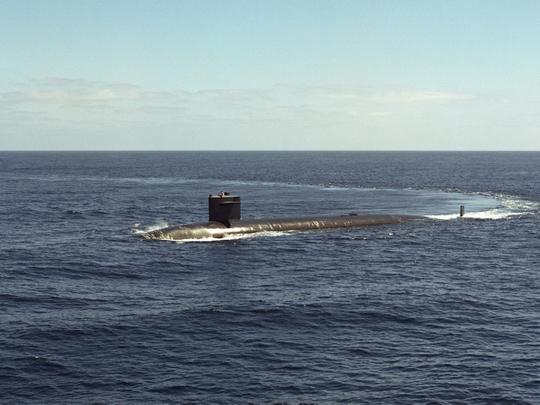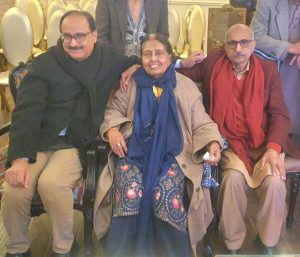An Indonesian submarine that went missing has been found broken into at least three parts, deep in the Bali Sea and all 53 crew members inside the missing KRI Nanggala-402 submarine have died. Death of a human is a heart shattering event and the loss of so many precious lives in a world already beset by a pandemic is soul numbing to say the least. Indonesian President Joko Widodo has rightly described the sailors as Indonesia’s "best patriots”.
Pakistan too is full of grief for this tragedy of a brotherly Muslim nation but the tragedy of the submarine has hit close to the nation as it has had a special relation with the Indonesian submarine fleet. Many remember the help Indonesia once gave to Pakistan in the wake of the 1965 war by sending submarines and naval boats to Karachi. While they had reached Karachi after the end of hostilities but the generosity of the gesture cannot be denied.
The Indonesian people were highly appreciative of the role of Pakistani UN troops, that facilitated the independence of Irian Jaya from Dutch colonialism. It can be said that this contribution of Pakistani troops played a major role in Indonesia dispatching Officers and sailors manning 2 Submarines, 2 Missile Boats and 2 Fast Torpedo Boats to Pakistan’s aid during the 1965 war.
Air Marshal Asghar Khan who was ambassador at that time has given a vivid detail of this assistance. The Air Marshal wrote in his book ‘The First Round’, of his arrival to the President’s palace in Djakarta. He was immediately met by President Sukarno who stated that Pakistan’s dire need is Indonesian’s dire need. Sukarno went on to say that it had been decided that Indonesia would give all possible help to Pakistan while reiterating that India’s attack on Pakistan was like an attack on Indonesia. He asked the Air Marshal to consider Indonesia as his own country and take away from there whatever he found could be useful to Pakistan in this emergency.
Asghar Khan also wrote of his later meeting with Admiral Raden Eddy Martadinata, who was head of the Indonesian Navy at the time. Martadinata asked whether this was all Pakistan wanted Indonesia to do at that time. When Asghar Khan asked what more the Indonesians could do, Admiral Martadinata replied. ‘Don’t you want us to take over the Andaman Islands?” citing a map, he continued, ‘that the Andaman and Nicobar islands are extensions of Sumatra and are in any case between East Pakistan and Indonesia. What right have the Indians to be there?” (Khan, 1979). Asghar Khan suggested that he should discuss the matter with his President. Asghar Khan confirmed that there would certainly be no regrets on the part of Pakistan if Indonesia occupied these Islands. Unfortunately Pakistan was not in position to assist them in performing this task. ‘In any case’, Admiral Martadinata assured, ‘the Indonesian Navy will immediately commence patrols of the approaches to these islands and carry out aerial reconnaissance missions to see what the Indians have there’ (Khan, 1979). The Indonesian Naval chief backed his words with substantial material aid for the Pakistan Navy. He ordered immediate transfer of submarines and boats to Pakistan.
According to Indian sources, the Indonesian threats to India’s coveted Andaman and Nicobar islands acted as a powerful deterrent that made India backaway from any untoward action towards the then East Pakistan. Indian Navy vice admiral G.M. Hiranandani wrote (George, 2021) "During the 1965 war, Indonesia’s stance was markedly pro-Pakistan. There was an increase in the sightings of unidentified submarines and aircraft in the Andaman and Nicobar islands. In response to Pakistan’s request for assistance, the Indonesian Navy sent two submarines and two missile boats to Karachi.”
For another Indian Admiral Bhaskar Sadashiv Soman, the Indonesian presence and proximity to the islands played heavily on his mind. He voiced his apprehensions in the book Blueprint to Bluewater: Indian Navy, 1951-65 when he stated “I also had some intelligence on the presence of some Indonesian ships at Karachi and knew that any operation undertaken by the combined naval forces of Pakistan and Indonesia would neither be against the Indian Fleet nor the Indian mainland. It was most likely to be for the capture of the Andaman and Nicobar Islands. I was quite convinced in my mind that the Indonesian Navy, knowing full well only a small force of sailors in khaki uniform was present on these islands, could make an attempt to capture the Nicobar Island.” (George, 2021)
The tragedy of the Indonesian submarine has hit the Pakistani nation quite deeply. While both nations already stand united owing to the ties of humanity and faith, the loss to the Indonesian Navy, a fighting force that answered Pakistan’s call in its hour of need, is an immense loss to the whole of Pakistani nation as well.










اے وی پڑھو